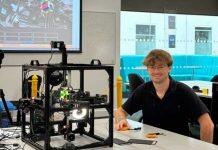The University of Glasgow has been announced as one of the founding partners of an ambitious new initiative to boost Scotland’s cutting-edge technology industries.


Scotland’s Critical Technologies Supercluster brings together Technology Scotland, Scottish Government, Scottish Enterprise, the University of Glasgow and the University of Strathclyde.
The Scottish Government’s Business Minister, Richard Lochhead, announced the formation of the supercluster at the Technology Scotland Annual Dinner on Thursday 14th November.
The supercluster has been created to formally bring together Scotland’s internationally recognised strengths in photonics, quantum, semiconductors, connectivity and sensing. This aggregation of expertise, unparalleled anywhere else in the UK, will play a key role in developing our industries of the future and will be a significant contributor to our future economic growth.
The supercluster currently supports nearly 11,000 highly skilled workers and generates revenues in excess of £4bn. As part of the launch, the Minister highlighted an action plan that will support growth above £10bn by 2035, creating an additional 7,000 jobs. This plan focusses on key themes such as skills, investment, scale up support and internationalisation.
Ally McInroy, CEO, Technology Scotland, said: “As well as being vital for our security, defence and economic independence, critical technologies will shape our ambitions in areas such as net zero, smart transport, energy and our broader advanced industries.
“Scotland’s collective strength across these technologies is extensive, positioning us well for the decade ahead. The supercluster has been created in recognition, not just of the technical overlaps between these technology areas, but also the shared supply chains, market areas and skills pipeline.
“Positioned correctly, the supercluster will also be a magnet for future investment and a platform to boost Scotland’s profile on the world stage. Technology Scotland are excited to take a central role in developing activity underneath the announced action plan, and we look forward to working with industry, academia and other partners to realise the superclusters’ potential.”
The supercluster complements the University of Glasgow’s wider efforts to strengthen industry connections in partnership with Scottish Enterprise and Glasgow City Council through the Glasgow Riverside Innovation District (GRID). GRID is working to boost existing collaborations with industry and encourage the formation of new ones in some of the most dynamic sectors of the economy.
Professor Chris Pearce, the University of Glasgow’s Vice Principal (Research and Knowledge Exchange), said: “Scotland’s established strengths in critical technologies hold significant potential to transform our society and economy. By bringing together Scotland’s capabilities in academia and industry across photonics, quantum, semiconductors, connectivity and sensing, the supercluster initiative allows us to showcase our strengths and develop policy solutions to accelerate the growth of these important sectors. The University of Glasgow plays a key role in the supercluster through our research, commercialisation activities and industry collaborations.”
At the heart of the University’s contribution to the supercluster is the James Watt Nanofabrication Centre, one of the UK’s leading facilities for turning fundamental science into components for cutting-edge devices and technologies used by global tech companies. The Centre’s capabilities have recently been enhanced with the £3m ANALOGUE suite for silicon chip integration and packaging, which offers advanced automation capabilities to partners worldwide.
Evelyn Toma, Director of Strategy at the James Watt Nanofabrication Centre, said: “The breadth and depth of the Scottish Critical Technology Supercluster has been a surprise to many people who are not directly involved in these areas. I am delighted that the James Watt Nanofabrication Centre has been part of this initiative. I believe the supercluster will allow us to accelerate our goal of achieving £10bn sales by 2035, and position Scotland as a leading hub for these technologies in the UK.”
Business Minister Richard Lochhead said: “It is fitting that a country so steeped in scientific history and innovation is leading in the fields of quantum, photonics, semiconductor, connectivity and sensing technologies. The Critical Technologies Supercluster has phenomenal potential – both in its role as a strategic driver for economic growth, and in redefining the way we live and work.
“As our Innovation Strategy and Programme for Government set out, the Scottish Government is committed to help position Scotland as one of the most innovative small countries in the world. We stand ready to help the Supercluster leverage our strategic advantages, lead the way in research and development and realise the tremendous ambition of our Critical Technologies supercluster.”








































